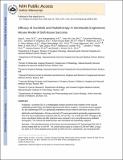Efficacy of Sunitinib and Radiotherapy in Genetically Engineered Mouse Model of Soft-Tissue Sarcoma
Author(s)
Yoon, Sam S.; Stangenberg, Lars; Lee, Yoon-Jin; Rothrock, Courtney; Dreyfuss, Jonathan M.; Baek, Kwan-Hyuck; Waterman, Peter R.; Nielsen, G. Petur; Weissleder, Ralph; Mahmood, Umar; Park, Peter J.; Dodd, Rebecca D.; Fisher, Carolyn J.; Ryeom, Sandra; Kirsch, David G.; Jacks, Tyler E; ... Show more Show less
DownloadJacks_Efficacy of sunitinib.pdf (1.476Mb)
PUBLISHER_CC
Publisher with Creative Commons License
Creative Commons Attribution
Terms of use
Metadata
Show full item recordAbstract
Purpose
Sunitinib (SU) is a multitargeted receptor tyrosine kinase inhibitor of the vascular endothelial growth factor and platelet-derived growth factor receptors. The present study examined SU and radiotherapy (RT) in a genetically engineered mouse model of soft tissue sarcoma (STS).
Methods and Materials
Primary extremity STSs were generated in genetically engineered mice. The mice were randomized to treatment with SU, RT (10 Gy × 2), or both (SU+RT). Changes in the tumor vasculature before and after treatment were assessed in vivo using fluorescence-mediated tomography. The control and treated tumors were harvested and extensively analyzed.
Results
The mean fluorescence in the tumors was not decreased by RT but decreased 38–44% in tumors treated with SU or SU+RT. The control tumors grew to a mean of 1378 mm[superscript 3] after 12 days. SU alone or RT alone delayed tumor growth by 56% and 41%, respectively, but maximal growth inhibition (71%) was observed with the combination therapy. SU target effects were confirmed by loss of target receptor phosphorylation and alterations in SU-related gene expression. Cancer cell proliferation was decreased and apoptosis increased in the SU and RT groups, with a synergistic effect on apoptosis observed in the SU+RT group. RT had a minimal effect on the tumor microvessel density and endothelial cell-specific apoptosis, but SU alone or SU+RT decreased the microvessel density by >66% and induced significant endothelial cell apoptosis.
Conclusion
SU inhibited STS growth by effects on both cancer cells and tumor vasculature. SU also augmented the efficacy of RT, suggesting that this combination strategy could improve local control of STS.
Date issued
2009-06Department
Massachusetts Institute of Technology. Department of Biology; Koch Institute for Integrative Cancer Research at MITJournal
International Journal of Radiation Oncology*Biology*Physics
Publisher
Elsevier
Citation
Yoon, Sam S., Lars Stangenberg, Yoon-Jin Lee, Courtney Rothrock, Jonathan M. Dreyfuss, Kwan-Hyuck Baek, Peter R. Waterman, et al. “Efficacy of Sunitinib and Radiotherapy in Genetically Engineered Mouse Model of Soft-Tissue Sarcoma.” International Journal of Radiation Oncology*Biology*Physics 74, no. 4 (July 2009): 1207–1216.
Version: Author's final manuscript
ISSN
03603016